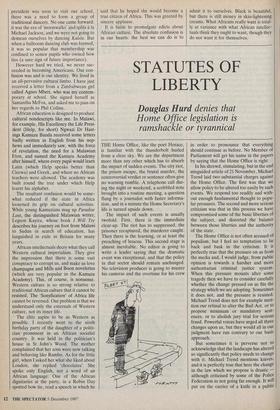STATUTES OF LIBERTY
Douglas Hurd denies that
Home Office legislation is ramshackle or tyrannical
THE Home Office, like the poet Horace, is familiar with the thunderbolt hurled from a clear sky. We are the department more than any other which has to absorb the impact of sudden events. The city riot, the prison escape, the brutal murder, the controversial verdict or sentence often give no warning rumble. A telephone call dur- ing the night or weekend, a scribbled note brought into a routine meeting, a question flung by a journalist with faster informa- tion, and in a minute the Home Secretary's life is turned upside down.
The impact of such events is usually twofold. First, there is the immediate clear-up. The riot has to suppressed, the prisoner recaptured, the murderer caught. Then there is the learning, or at least the preaching of lessons. This second stage is almost inevitable. No editor is going to write a leader saying that the dramatic event was exceptional, and that the policy in that sector should remain unchanged. No television producer is going to muster his cameras and the overtime for his crew in order to pronounce that everything should continue as before. No Member of Parliament will get his name in the papers by saying that the Home Office is right. In his shrewd, stimulating, but in the end misguided article of 21 November, Michael Trend laid two substantial charges against the Home Office. The first was that we allow policy to be altered too easily by such events. We respond too readily and with- out enough fundamental thought to popu- lar pressures. The second and more serious criticism was that in this process we have compromised some of the basic liberties of the subject, and distorted the balance between those liberties and the authority of the state.
The Home Office is not often accused of populism, but I feel no temptation to lie back and bask in the criticism. It is perfectly true that the pressure on us from the media and, I would judge, from public opinion is towards a harsher and more authoritarian criminal justice system. When this pressure mounts after some tragedy then we have to consider carefully whether the change pressed on us fits the strategy which we are adopting. Sometimes it does not, and the pressure is resisted. Michael Trend does not for example men- tion our refusal to alter the Bail Act, or to propose minimum or mandatory sent- ences, or to abolish jury trial for serious fraud. Powerful voices have urged all three changes upon us, but they would all in our judgment have run contrary to our basic approach. But sometimes it is perverse not to acknowledge that the landscape has altered so significantly that policy needs to change with it. Michael Trend mentions knives, and it is perfectly true that here the change in the law which we propose is drastic — although criticised by some of the Police Federation as not going far enough. It will put on the carrier of a knife in a public place the onus of showing a legitimate reason for doing so. But it is hard to see how otherwise to reverse the disastrous change in street culture which has occurred in the last few years, with an increasing number of youths routinely carrying knives. We could of course ponder yet further and confide the matter to some weighty commission; but the price might be rather high in terms of stabbed citizens and police officers.
We are not proposing anything like the same shift in the law on firearms, because the law on carrying firearms is already strong. Here we are suggesting to Parlia- ment essentially a substantial tightening of administrative controls within the framework and categories of the existing 1968 Firearms Act. On firearms I con- fidently expect to continue to be assailed simultaneously for doing too little and too much, for acting with breakneck speed and with culpable lethargy. This example leads straight to Michael Trend's point about balance. The citizen wants protection against the criminal, and most citizens are willing, I would judge, to see the balance tilted in favour of the police and the power of the law in order that criminals might more readily be deter- red and punished. But the Home Office and Parliament have to remember the balance between the need of the citizen to be protected from crime, and the liberties of the citizen as an individual faced with the coercive power of the State and the courts. Every major piece of legislation needs to be tested in that balance.
It does not of course follow that the balance needs to be struck in the same place all the time. Peremptory challenge to jurors is a good example. When a defen- dant, perhaps barely literate, was hauled before the Assizes to be tried for offences against property, the penalty for which was very heavy, perhaps even capital, under a procedure where he was not allowed to give evidence in his own defence, then it was reasonable to balance the scale of justice by allowing him to remove jurors without cause. The position is wholly different today and there seems no reason for retaining this distortion of the random nature of the jury — which is why we propose to abolish it in the Criminal Justice Bill.
Nor is this balance between the protec- tion of the citizen and his individual liberties always easy to analyse on the ground. No one interested in criminal justice can forget the noisy campaign against the Police and Criminal Evidence Bill. It was fiercely criticised in the prog- ressive newspapers and in a final fling the wealth of the GLC was deployed to make noise against it in the streets. Citizens were encouraged to 'Kill the Bill', which was represented as an amazing new engine of tyranny. We maintained throughout the passage of the Bill that it struck the legitimate balance between the ability of the police to protect the citizen and the citizen's liberties as an individual. Now we can see that this was true. As the Police and Criminal Evidence Act came into force it was the police who worried about the need to find a custody sergeant to take charge of those detained in police cells, about the increasing presence of solicitors in police stations, about the need to take contemporaneous notes of interviews in police stations, and about the duty of a constable to record whenever he could the circumstances of a stop and search. The police are now coming to terms with the Act, realising that their first interpretation was somewhat pessimistic and that much of the Act simply embodies the prudent and best practices of a professional police force. Indeed, when discussion started about the right to silence, a number of lawyers and civil liberties groups seemed to argue that the Police and Criminal Evi- dence Act was the best defence of the citizen's liberty.
It is legitimate at this stage to throw into discussion the way in which the right to silence is exercised, and ask whether the balance here is still true. From some comment you might surmise that we were proposing to bring back the thumbscrews. No suspect can be forced to break silence in a police station or a court. The question is whether the exercise of the right to silence should in all circumstances itself be covered by silence or whether in certain circumstances the jury should be entitled to know that the right has been exercised. Does this in 1987 and hereafter strike the right balance between protecting the citizen from wrongful condemnation and protecting him from crime?
These questions of balance are put and answered throughout government depart- ments, our ministerial committees, our parliamentary examination and finally our law courts. There has never been and is not today anything exactly pell-mell about these processes. We have considered four substantial parliamentary measures in this general field. The Prosecution of Offences Act created a new, independent prosecu- tion service. The Police and Criminal Evidence Act stemmed from the report of a Royal Commission, the Public Order Act from a painstaking review of existing law. The Criminal Justice Bill seeks to respond to years of discussion on several matters such as lenient sentences, extradition and criminal compensation. Of course the con- text of each has been influenced by the political process, including the views of three Home Secretaries, as is right and inevitable. But no one looking back at these three Acts will judge them either as ramshackle or as tyrannical. I believe that taken together they will bear comparison with the cautious but thorough work of Peel 160 years ago.











































































 Previous page
Previous page